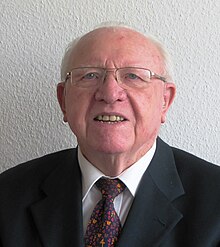Konrad Carl
Konrad Carl (born January 20, 1930 in Fürth ) is a former German trade unionist .
After attending elementary school and training as a carpenter , he began to get involved in trade unions at an early age. On May 1, 1946, Carl joined the Bau-Steine-Erden industrial union (IG BSE) and attended the Dortmund Social Academy. His trade union career then took him through various positions as managing director of the administrative office of IG BSE in Regensburg and district manager of IG BSE in Bavaria to the federal executive board, to which he had been a member since April 1968. On the federal executive board he was responsible for personnel and legal matters. In 1969 he became deputy chairman Rudolf Sperner . His critical and keen understanding made him a good advisor, especially because of his recognized general knowledge. Carl has also been a member of the SPD since 1960 .
In October 1982 he was elected federal chairman at the 12th Ordinary Trade Union Day of IG BSE in Frankfurt am Main . He held the chair until 1991, when Bruno Köbele was elected as his successor.
During his time as union chairman, there was an internal trade union dispute about the course of the IG BSE. A group around the Stuttgart district manager Gerhard Schramm criticized the IG BSE's policy as not being left enough and called for a change of course. In order to keep Gerhard Schramm out of the federal executive committee, the executive committee was reduced from nine to seven members at the 1982 trade union day. A Stuttgart union member sued against this decision and the election of the board. The Federal Supreme Court largely upheld the complaint and decided that the election of 5 of the 7 board members was invalid. The election of Konrad Carl, however, was confirmed. At the 1985 trade union convention, Konrad Carl was clearly confirmed, and the Stuttgart-based company's amendments to the statutes were rejected.
During his presidency, the IG Bau Steine Erden became a modern trade union by adding that of ecology to the field of economy. On the business side, he was respected for his tenacious but always correct negotiation. Many collective bargaining decisions such as the early retirement scheme for construction workers, one of the most important collective bargaining agreements of the post-war period, and the standardization of construction workers' wages in all federal states bear his signature. At the time of reunification, he arranged for the former GDR trade union Bau-Holz to be incorporated.
The high point of his international trade union activity was the chairmanship of the International Federation of Construction and Woodworkers (IFBWW) from December 1985 to 1993. In addition to his trade union activities, he also performed several voluntary functions, including a. as an honorary judge at the Federal Labor Court and as an employee representative on supervisory boards. Among other things, he was on the supervisory board of the union holding Beteiligungsgesellschaft für Gemeinwirtschaft AG (BGAG).
For his union involvement he was awarded the Great Cross of Merit of the Federal Republic of Germany in 1990 and the Hessian Order of Merit in 1991 .
In recognition of his services, a “Konrad Carl Certificate” has been awarded since 2010, which is awarded once a year in Franconia to a deserving honorary union member.
Web links
- Former IG BAU chairman Konrad Carl celebrates his 80th birthday (accessed from IG BAU Online on January 22, 2010)
- Konrad Carl in the Munzinger archive ( beginning of article freely accessible)
Individual evidence
- ↑ Der SPIEGEL 38/1983
- ↑ Hans Fischer, an excellent trade unionist , mainpost.de, March 6, 2013
| personal data | |
|---|---|
| SURNAME | Carl, Konrad |
| BRIEF DESCRIPTION | German trade unionist |
| DATE OF BIRTH | January 20, 1930 |
| PLACE OF BIRTH | Fuerth |
